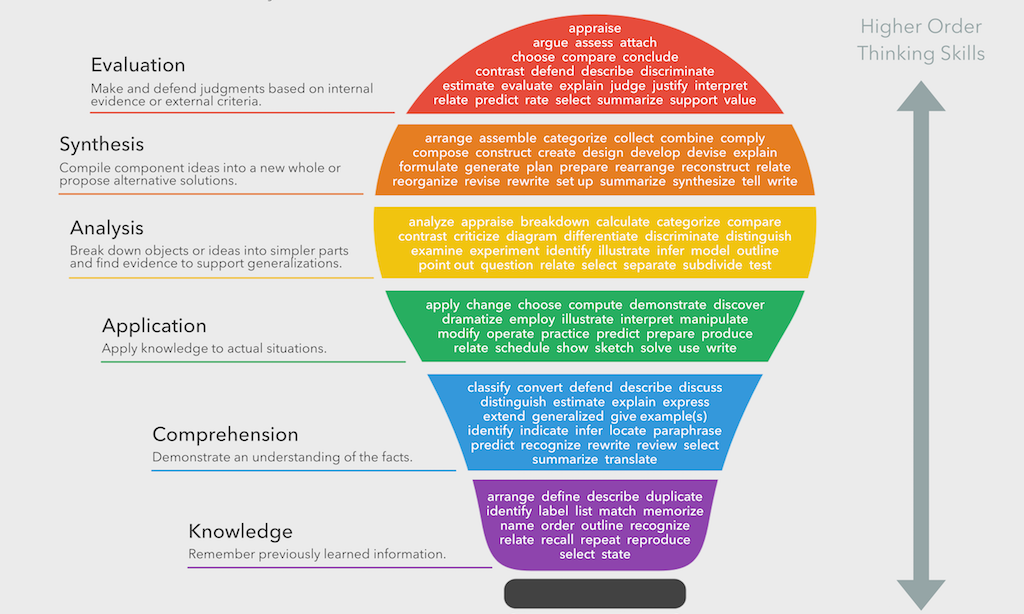“But these are the ones sown on good ground, those who hear the word, accept it, and bear fruit: some thirtyfold, some sixty, and some a hundred.” Mark 4:20
Early in my education career, one of the topics on which we frequently received professional development was Bloom’s Taxonomy. Terry Heick summarizes, “In one sentence, Bloom’s Taxonomy is a hierarchical ordering of cognitive skills that can, among countless other uses, help teachers teach and students learn.” I believe helping people understand these different levels of thinking within the context of spiritual understanding will help them know whether they will produce fruit for the Kingdom of God. Depending on which level you reach in your ability to think and reason through things, that will be your determination of how much your understanding of God’s Word will impact the world around you. (Spoiler: Fruit-bearing begins at the APPLICATION level.)
(I thought perhaps I would sum up this entire idea in one devotional, but quickly realized y’all don’t probably want to read a 20 page report, so I’m going to cover one level every week until it’s done!)

This week I’m going to unpack the importance (and the dangers) of the third level of thinking: APPLICATION.
Consider the child who hears the dreaded words from a parent: “It’s time to clean your room.” Unless the child is very young or has trouble processing commands it is very clear a child hears these words by their reaction. Depending on the disposition of the child this request can be met with anger, sadness, or an immediate sluggish state of being in which they seem to have trouble operating any of their limbs, all of which can frustrate the parent. KNOWLEDGE: check. And any parent (assuming they can get said child to the bedroom) who has done this dance before also knows to check COMPREHENSION of said task. They may ask the question, “And what does a clean room look like?” or “How will you know when the job is done?” Otherwise, a parent will end up with a colossal assortment of clean and dirty clothes, plates covered with food and toys shoved under the bed or in the closet! (Kids: This is not considered a “clean room.”) And so now the child is left to make a choice: Take the knowledge of the parent’s command and understanding of the parameters of the parent’s clean-room standard and apply it to their room…or not. This is the APPLICATION level of knowledge: to put into practice the knowledge and skills learned through action.
A child can know exactly what his or her parent wants them to do (KNOWLEDGE), as well as the exact standard by which to do it (COMPREHENSION) and still not please the parent if they don’t actually do the thing (APPLICATION).
The Bible addresses this very specifically in James 1:22-25:
Do not merely listen to the word, and so deceive yourselves. Do what it says. Anyone who listens to the word but does not do what it says is like someone who looks at his face in a mirror and, after looking at himself, goes away and immediately forgets what he looks like. But whoever looks intently into the perfect law that gives freedom, and continues in it—not forgetting what they have heard, but doing it—they will be blessed in what they do.
If you’ve ever heard anyone talk about head knowledge vs. heart knowledge this is where the rubber meets the road. When you truly understand something in your heart it will spur you to action. It will compel you to take the things you’ve learned and understood in your head and produce a heart reaction. Consider these scenarios:
(KNOWLEDGE)
- A fire alarm sounds. Brain: Fire alarm = fire.
- See a $20 bill fall from a woman’s purse. Brain: That woman dropped some money.
(COMPREHENSION)
- Visions of fire burning the surrounding area, smoke suffocating people ensues. Brain: Uh-Oh!
- Understanding of the women’s distress when she discovers the money is missing. Brain: Yikes!
(APPLICATION)
- Knowledge and understanding about fires and the consequences stimulates your fear response (heart) and prompts you to leave the danger area or to put the fire out.
- Empathy of knowing what it feels like to lose something dear (heart) prompts you to alert the woman’s attention to the money on the ground.
Taking action in these situations actually bears fruit in your life. In the fire scenario, the fruit is that you live to see another day or if you are successful in fighting the fire, stopping it from spreading. In the second, you managed to help another person and save them from sadness later. None of those things would have happened without you acting upon the knowledge and understanding you had in those situations.
The danger of APPLICATION is that you can choose to remain inactive in the face of knowledge and understanding, rendering yourself useless for the Kingdom. (Bearing no fruit) Or even worse, our free will and ability to follow the flesh instead of the Spirit can lead us to make really poor choices in spite of the knowledge and understanding we have (Bearing bad fruit).
Jesus had parables to discuss both of these situations where APPLICATION level is corrupt:
“The axe is already laid at the root of the trees; therefore every tree that does not bear good fruit is cut down and thrown into the fire.”
Matthew 3:10
“‘If it bears fruit next year, fine! If not, then cut it down.’”
Luke 13:9
And just as in the COMPREHENSION level we are held responsible for what we know, we are also held responsible for what we choose to do (or not do) in the APPLICATION level. Does this mean that if you bear no fruit or bad fruit you are not saved? Not necessarily. However, it does warrant a heart check if you want to be someone who can and will be used by God for his Kingdom purposes. You may have a ticket to the heavenly places, but you may not be sowing or reaping any of the benefits by being there in the now.
So, we now realize that we must have KNOWLEDGE of the Word, COMPREHENSION of the Word, and using those creates APPLICATION of the Word. This is where we can begin bearing fruit for the Kingdom of God. Our sower/seed parable tells us, though, that people can bear fruit at differing levels! So in the next week’s devotional I’ll talk about how we get to the 30, 60 and 100 fold level of fruit-bearing for the Kingdom of God. Get ready to learn about the higher levels of learning!

